Where Are The World’s Best Open Device Labs?
Every developer knows that just because a website looks like and does what it’s meant to on the latest iPhone, doesn’t mean it will work across every mobile device. In this article, we’ll highlight some of the many open device labs out there — fantastic and helpful initiatives by the community that deserve support and attention.
Open device labs (ODLs) are a response to the myriad of operating systems, browsers and devices that litter our technical landscape. They offer developers a (usually) free space to go to test their web systems, websites and apps on a range of software and hardware. This premise forms the core of the OpenDeviceLab.com initiative, which is a community movement to help people locate the right ODL for the job and to drum up further support for these testing centers.
Andre Jay Meissner, founder of LabUp! and OpenDeviceLab.com, explains:
"Testing on a variety of real devices is crucial for ensuring the intended user experience, especially looking over the boundaries of each ones own cultural and/or economic area. But, by far not everybody has access to the necessary test bed. Think of people producing content/apps for the first world, not taking less developed regions or those with a completely different mobile device landscape into account — the business will fail on one side, since UX or even plain accessibility will suck on the other."
He adds:
"ODLs even provide ways to get stakeholders and customers to live the urge for necessary budget decisions on quality assurance, accessibility and I18n and L10n."
Consolidating The ODL Landscape
There are now more than 150 ODLs in 35+ countries, but ODLs may have reached the peak of their popularity, given the growing attention on in-house device labs (IDLs).
While new ODLs are opening at a constant rate, a handful of ODLs have closed down due to a lack of demand. Penn State University, for example, recently closed its ODL and replaced it with a virtual-only offering, due to a lack of funding, despite being the only one in the region. This virtual testing environment now mainly uses BrowserStack and similar virtual machine (VM) platforms.
Greg O’Toole, a lecturer at Penn State University, says:
"We have had fairly consistent interest and inquiry levels from groups and individual software developers from around the Penn State community and the PA community at large looking for ways to get involved and/or utilize the offerings of the ODL@PSU over the past 24 months. I am optimistic still. We have had several offers from these community members to donate Fitbit devices, old laptops, etc. which sort of orbit around the target set of devices we are looking for."
ODLs Have Opened Doors For IDLs
IDLs do seem to be a popular option. Many of the labs we spoke with originated on a company’s property, eventually opening up as ODLs to support the development work of others.
Christian Schaefer, freelance front-end developer from the ODL initiative, says:
"I don’t think ODLs are important in today’s technical landscape, IDLs are. ODLs served the purpose of steering the people’s interest towards the topic of real device testing. And ODLs may also be blueprints for how to set up such a thing yourself, inhouse. But reality shows that ODLs are often only used by their owners/administrators. ODLs not being used by external people has to do with convenience and also with access to development infrastructure, which is mostly only available within a company. That’s why companies started assembling their own device labs — sometimes opening it up to others, thereby creating a new ODL."
Andre adds:
"In general, ODLs located at companies see way lower public usage as compared to ODLs in public places, like co-working spaces, libraries, or places that have been built solely for running the ODL. Privacy and competition are to be taken into account, this is where some companies posted excellent upfront statements and provided physical space separate from their regular offices — others didn’t."
ODLs are particularly popular in the UK and Germany, with other such labs popping up around the world. Whether you want to call them ODLs or IDLs, the need to test on physical devices seems unlikely to lose momentum.
Here are some of the best ODLs for the developer community:
Germany
Open Device Lab (Augsburg)
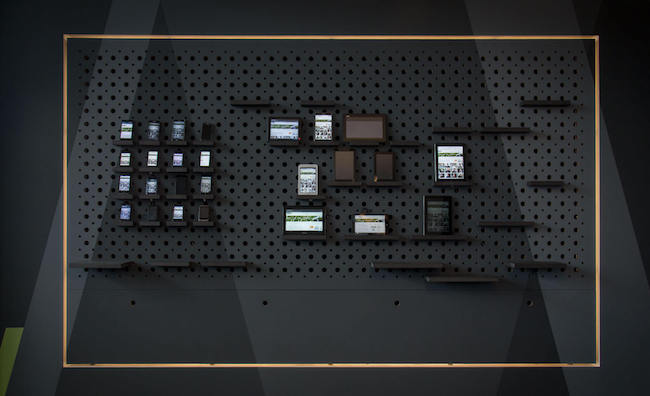
Address: Team23 GmbH & Co. KG, Provinostraße 52 / Building , 86153 Augsburg, Germany
This stylish lab is the only one in the Augsburg region of Germany, and you can get a free coffee if you work here. It supports its users with a balance of professional knowledge and consulting in fields such as design and UX (as a member of the German Berufsverband User Experience und Usability (UPA) group) and development (with Magento certification and Drupal Association membership).
The lab also works with the University of Applied Sciences to support its students in classes and projects.
Pbi Planungsbüro INTERNET (Hamburg)
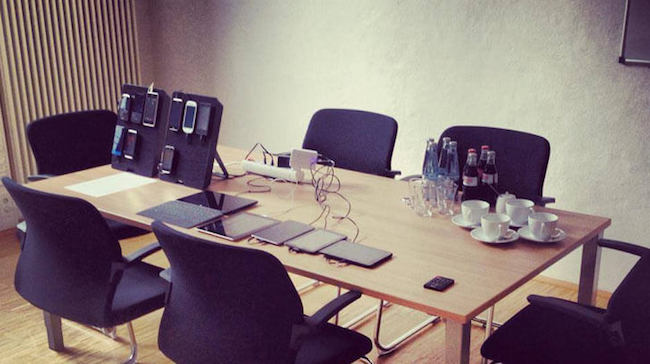
Address: Alter Teichweg 25a, 22081 Hamburg, Germany
All devices in this test lab run with purchased OS versions and offer a virtual environment for each major Internet Explorer (IE) version and Windows operating system. You can use one of the lab’s computers equipped with a Ghost Lab license and test pages simultaneously on multiple devices. Plus, there’s free coffee and water, as well as a friendly team to chat about the latest trends and operating systems.
LAUNCH/CO (Hamburg)
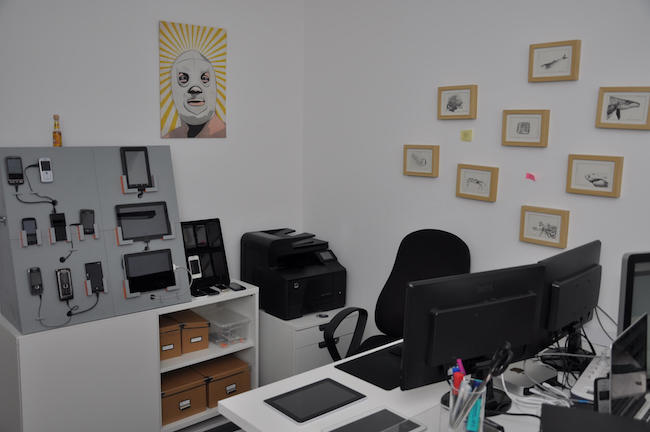
Address: LAUNCH/CO Hamburg, Neuer Kamp 3, 20359 Hamburg, Germany
This lab maintains a wide range of setups and devices, and it is open for ad-hoc testing sessions; that is, people can usually drop in the same day to test, without booking ahead.
It is run by fellow developers, and someone is always there to help if a question arises or advice is needed. Devices are also lent out on request.
Sevenval (Cologne)
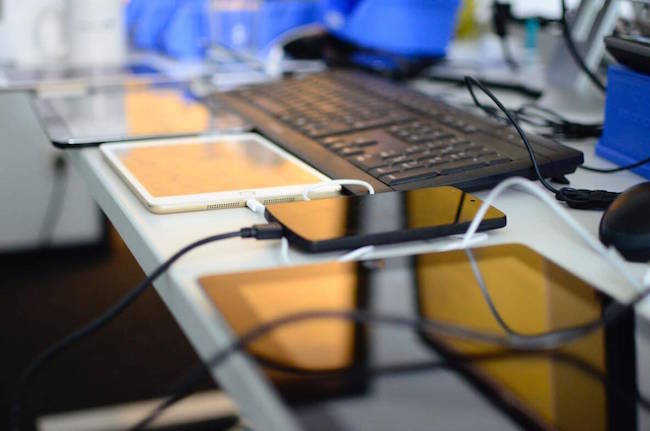
Address: Bahnhofsvorplatz 1, 50667 Cologne, Germany
This long-standing lab has worked in the mobile space for more than 15 years. Its work has spanned many technologies, including WAP and J2ME, CHTML (aka i-mode) and XHTML/MP, the W3C Mobile Web Initiative, the app store (thanks to the iPhone and Android devices), HTML5 and responsive web design, and it’s adapting to a (potential) future with progressive web apps.
This lab doesn’t just focus on mobile devices, though — it also houses some specialist devices, such as Oculus Rift and Google Glass.
BNT.DE GmbH (Frankfurt Am Main)
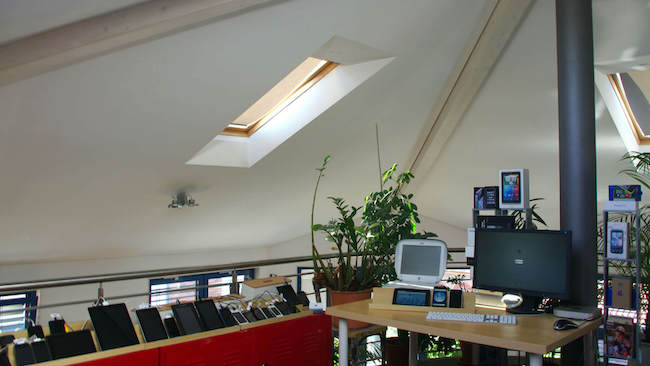
Address: c/o BNT.DE, Löwengasse 27E, 60385 Frankfurt am Main, Germany
With continued five-star ratings, this lab is a popular choice with its users and engages in regular meetups. It has 32 devices and offers paid testing sessions for larger companies. This busy lab also requests users to make an appointment before turning up.
The UK
DeviceLab EDI (Edinburgh)

Address: CodeBase, Argyle House, 38 Castle Terrace, Edinburgh, EH1 2EL, UK
This is one of the few labs in the world that uses a charging model to keep the facility up to date with OS and hardware releases, with all the money made going back into keeping the lab open. This ODL is also exploring other tasks it can help the community with, like adding usability testing facilities for guerilla user testing, session recording and remote observation.
The lab offers free access for open-source and community projects, ad-hoc rates from £25 per hour for small businesses, and monthly subscriptions that help it maintain recurring revenue and stay open.
The team also built a private test lab for the Scottish government’s web team and is currently working on some interesting analytics tools for identifying the right test coverage for your audience.
Si Digital ODL (Southsea)
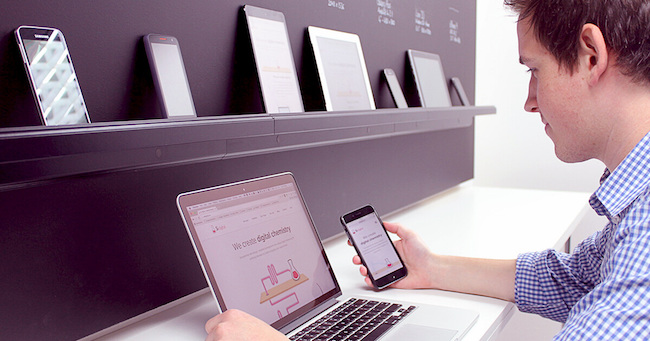
Address: The Old Treasury, 7a Kings Road, Southsea, PO5 4DJ, UK
This lab may have been open only a few months, but its dedicated private space is already home to several key devices. All devices are laid out and labelled on shelves, with a work area where you can use browser sync on your laptop to experiment with the layout.
The ODL space can also be booked for usability testing. It houses dedicated Windows and Mac laptops that stream user website tests to a screen outside the room for observation and analysis. This facility allows developers and designers to ensure that every project delivers a seamless and engaging user experience.
Open Device Lab (Southampton)
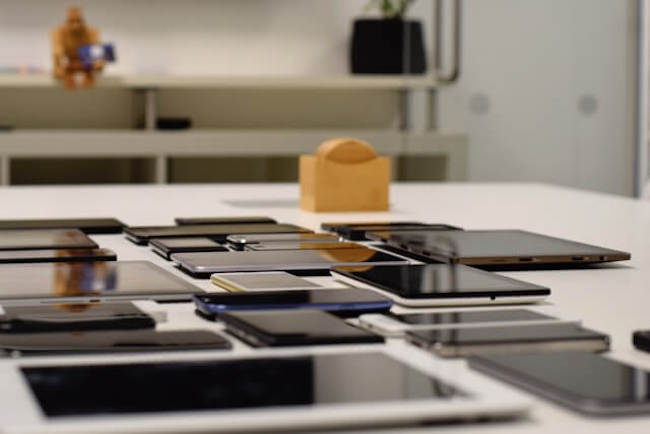
Address: 12 Basepoint, Andersons Road, Southampton, Hampshire, SO14 5FE, UK
With more than 25 devices, ranging from an iPhone 6 Plus to an old HTC Desire rocking Android 2.2, this ODL allows the local community to test on real devices, old and new, to make sure their projects work for as many people as possible.
This ODL is a big fan of progressive enhancement and encourages people to build resilient and inclusive websites. The relaxed and collaborative environment in the office also means that team members are on hand for advice.
Adam Tomat from the lab says, “We started the ODL because the local community is important to us. We recognised how difficult it is to test responsive websites without access to real devices and also how unfeasible it is for every individual or organisation to acquire a large enough selection. It’s been a great way for us to connect with new people, start conversations and help to build on the existing digital community here in Southampton.”
We Are Base (Bournemouth)
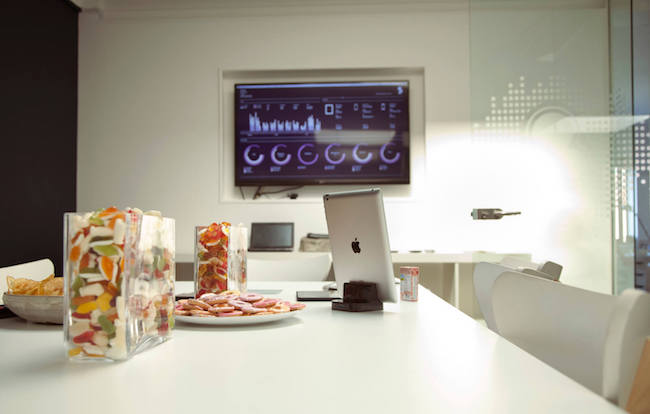
Address: We Are Base, 65 Seamoor Rd, Bournemouth, BH4 9AE, UK
Believed to be the largest collection of open devices in the world, this ODL has more than 440 devices available to use for web and app testing. With everything from brand new devices to old niche devices available, you can book for 1 to 2 hours per day, and only 10 devices can be booked out at a time, for security reasons.
Aside from being the largest in the world, this lab is right in the heart of one of the UK’s fastest-growing tech clusters in Bournemouth and Poole and provides an essential resource for local agencies, product teams, freelancers and students.
Foolproof (London)
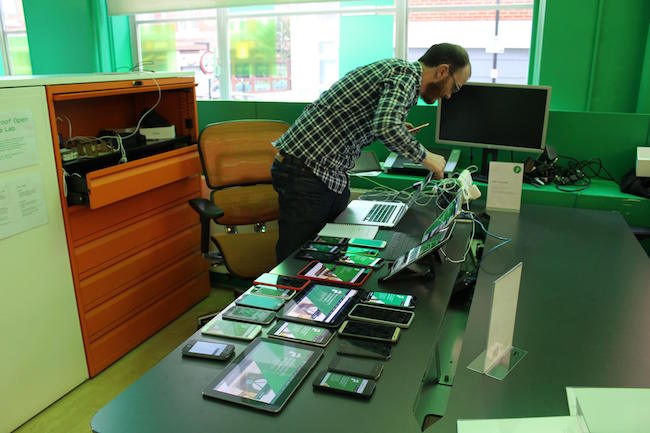
Address: Harella House, 90-98 Goswell Road, London, EC1V 7DF, UK
This popular London-based device lab has four hot seats in its studio, so you get access to a lot of kit, and you can feel like part of the studio as you see the lab’s practitioners at work.
Former managers have given each of the lab’s devices a name under their own naming convention. The current manager names devices after movie characters. Its latest phone is “Johnny the iPhone 7 Plus,” which you might recognize from the Short Circuit films. If you’d like to use Johnny or any of his 52 companions, write to device.lab@foolproof.co.uk.
Cover-Up Lab (Bridgend)
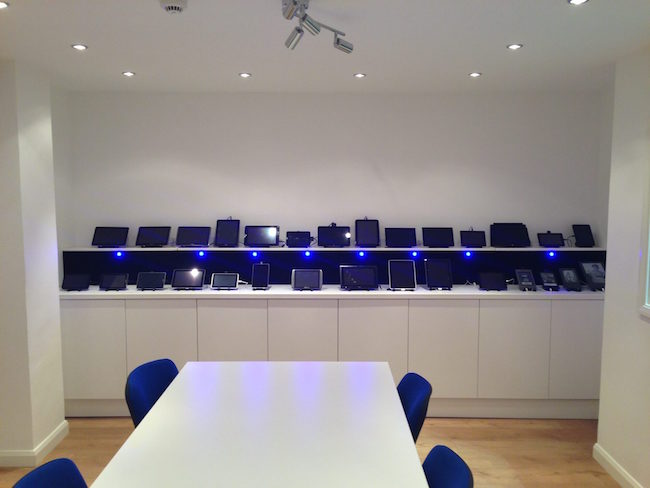
Address: Unit 1, George Street, Bridgend, CF31 3TS, UK
Cover-Up’s core business is creating innovative accessories for a selection of phones, tablets and laptops. As a result, for each new product range that it creates, it always buys the device, so that it can test firsthand. So, the company has a huge selection of gadgets that laid around for many years gathering dust — until its ODL was born.
The ODL now houses dozens of devices and is open 9:00 to 17:00, Monday to Friday. Just drop the team an email to book a spot at this ODL serving South Wales.
Indylab (Swansea)
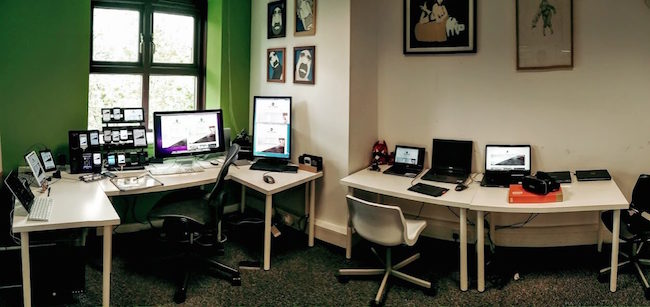
Address: Indycube, 3rd Floor, 11 Wind Street, Swansea, SA1 1DP, UK
This lab holds a variety of screen sizes, from televisions down to watches, and also has devices of varying quality, from old monitors to HD screens. A selection of input types are available, such as trackpads, mice, styluses and screenreaders, installed to test for issues beyond just screen layout, which is a nice touch.
This balance of old and new devices is important, as Paul Burgess from the Indylab explains: “We shouldn’t assume that everyone is using the latest technology. Many people are using devices that haven’t been updated in a long time, so we include some older operating systems and pre-smartphone devices, as well as an iPod running a vintage iOS 2.2.1.”
Rest Of Europe
Open Device Lab (Gent)
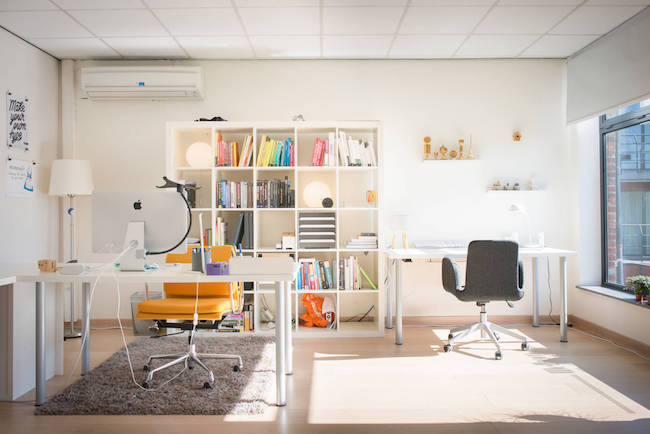
Address: Dendermondsesteenweg 48a, Gent, Belgium
Studio Massis is a coworking studio created by and for creative freelancers located in Gent, near the Dampoort railway station.
The space holds a range of mobile devices, and testing can be done free of charge on the premises. You can take devices to test at your own office, but there is a fee and warranty request for this service.
Open Device Lab Brussels (Anderlecht)
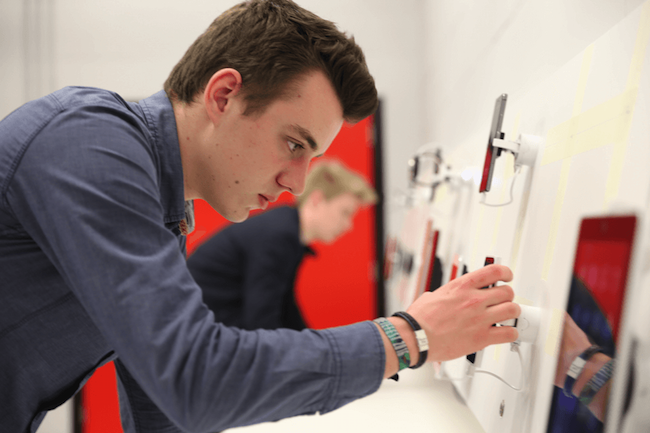
Address: Nijverheidskaai 170, 1070 Anderlecht, Belgium
This new lab is just starting out, so not everything is set up yet. This ODL not only provides mobile devices for app and web development, but also has a green key, motion-capture suits and a broad range of media devices, including VR headsets and cool stuff like Leap Motion.
The lab depends on Erasmus University College Brussels, so priority goes to students during weekdays. The lab is reserved every Wednesday, serving visitors from 13:00 to 21:00.
Open Device Lab (Helsinki)
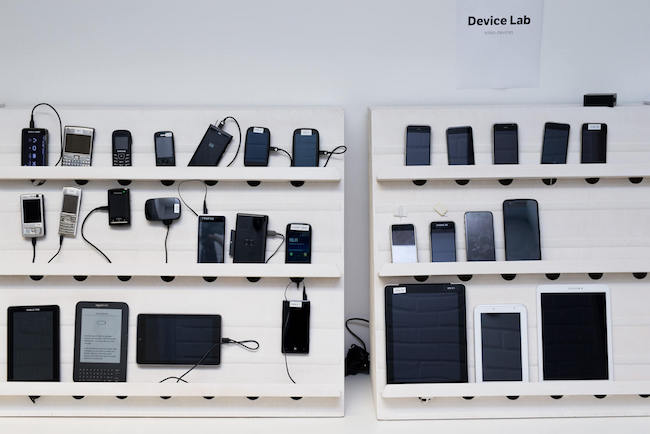
Helsinki’s Open Device Lab was established to help the local web developer community test their work on the ever-growing range of mobile devices. (View large version)
Address: Vilhonvuorenkatu 11 D 00500, Helsinki, Finland
This lab is provided by software house Kisko Labs and houses dozens of mobile devices for the web developer community. The lab is open during usual business hours and is located in the Sörnäinen neighbourhood.
The lab also has a small gym, complete with pull-up bar, gymnast rings and a rowing machine. If you fancy trying out this energetic lab, email ahead to check availability.
Frontlab (Amsterdam)
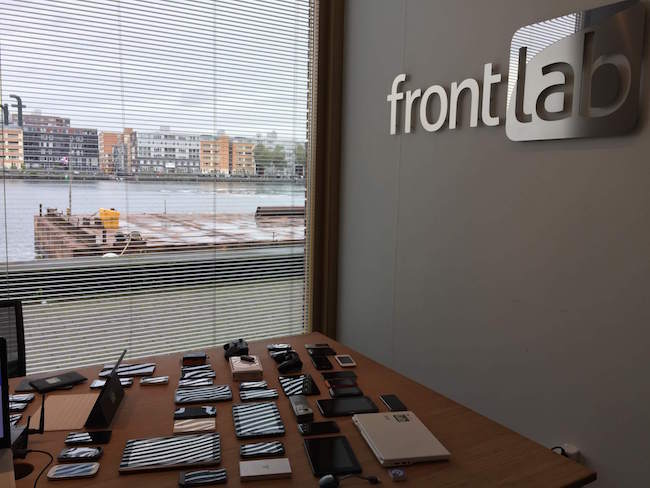
Address: Veemkade 328, 1019 HD Amsterdam
This ODL contains a lot of obscure devices with non-mainstream operating systems such as Firefox OS, BlackBerry Playbook and even a few webOS, Ubuntu Phone and Tizen devices. Access to the device lab is free, and coffee is even provided.
The lab recently received a great number of donated devices have not yet been unpacked, tested or listed on the website. So, more to come!
Incentro (Rotterdam)
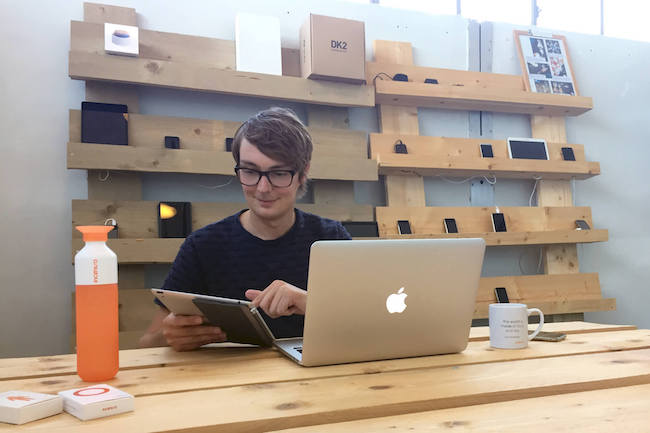
Address: Incentro Rotterdam (building Koffie, Unit 2429, 4th Floor), Van Nelleweg 1, 3044BC Rotterdam, The Netherlands
This lab is located in Van Nellefabriek, a UNESCO World Heritage Site. It houses a broad variety of devices, from the more common iPhone devices to old BlackBerrys, Google Glass and Oculus Rift. Visitors can also work in a closed-off space to focus on debugging and testing applications.
The lab’s goal is to help people build better software. It is used for the internal projects of digital service company Incentro, but anyone is welcome to use this space.
Ideato (Cesena)
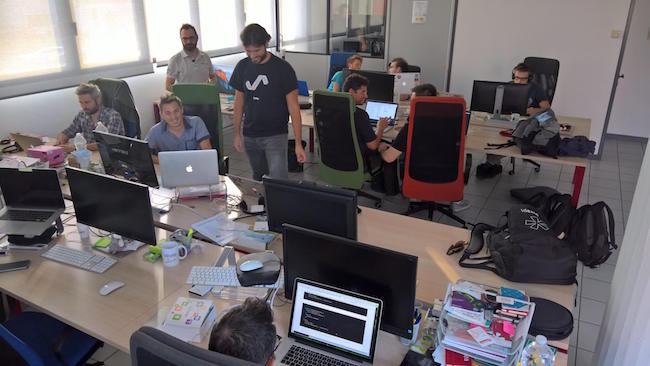
Address: Piazza Sanguinetti 106, 47522 Cesena (FC), Italy
This friendly space is run by software house Ideato, which also organizes meetups every month to hack new technologies.
The ODL has 12 mobile devices, and Ideato staff are on hand to help users with any issues and inquiries.
Bouvet Devicelab (Bergen)
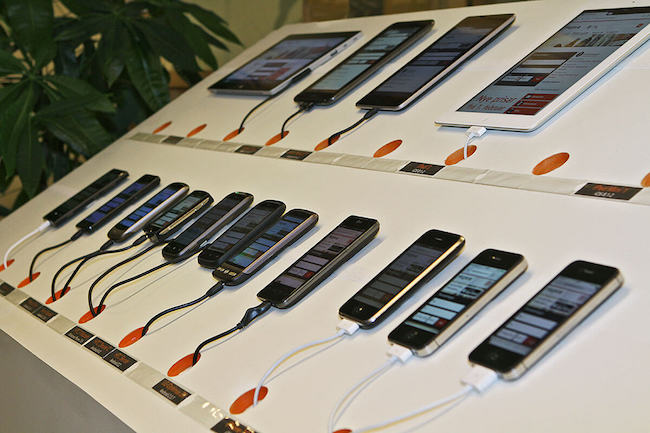
Address: Bouvet, Solheimsgaten 15, 5058 Bergen, Norway
Users can come here to test devices, or the lab can test a solution on your behalf (for a fee). With 18 devices and more added all the time, you can see your application on all devices simultaneously.
MODL (Malmö)
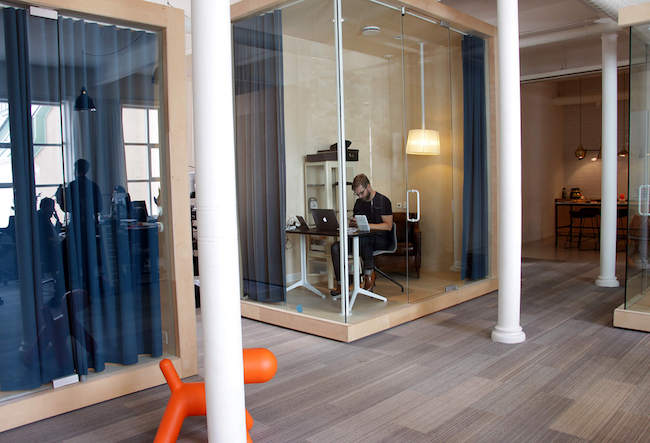
Address: C/O inUse, Gustav Adolfs Torg 10B, 4th floor, Malmö, Sweden
This lab is hosted in a cozy office, populated mostly by experienced digital designers — but it is run by a couple of passionate front-end developers. There’s always free coffee, and you can also chat with others in the same industry while you take a break from testing. Despite being in an open office, you can pull the drapes on the glass box for some privacy while testing.
This ODL only allows for websites to be tested, not native apps, due to administrative difficulties with developer units.
DeviceLab Switzerland (Lausanne)
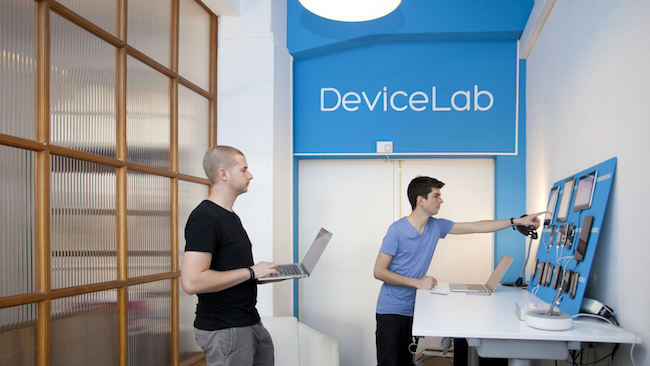
Address: Rue de Sébeillon 9B, 1004 Lausanne, Switzerland
With free coffee, this ODL is the first one in the French-speaking part of Switzerland. The team takes the time to help users set up and use their devices. The lab is now also available in a portable format (a suitcase), which you can take with you (free of charge) to test from your place of work.
The local multimedia school (Eracom) often comes to look at its projects on old devices, and user-testing sessions are also organized in the lab twice a month.
North And South America
Thunder::tech User Experience Lab (Ohio)
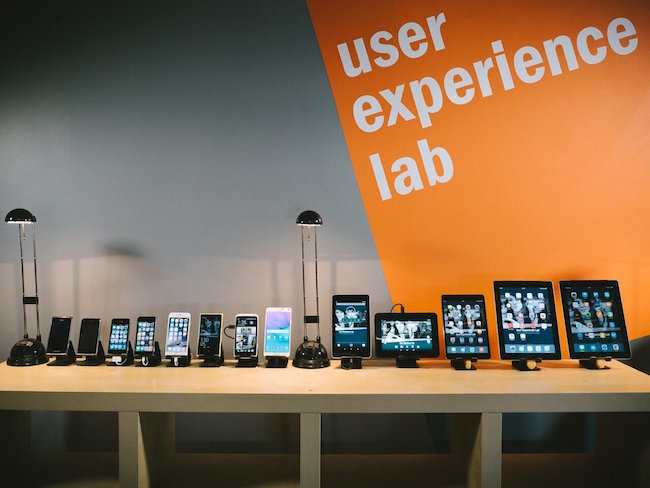
Address: 3635 Perkins Ave, Cleveland, Ohio 44114, USA
The thunder::tech User Experience Lab provides an array of devices that cover a wide range of operating systems and screen sizes, for testing most real-world scenarios. It also houses some unusual items, including a 3D printer for rapid prototyping, wearables such as Google Glass, Samsung Gear VR, Apple Watch, Android Wear watch and interactive devices such as Leap Motion.
Over the last year, this ODL has hosted a Cleveland UXPA event, in which the lab discussed its process for testing clients’ websites. Madison Letizia, social-media team manager at thunder::tech, says, “That’s a big step from where our lab was started many years ago as it originally used only employees’ personal smartphones to fill the need of website testing for client projects. It quickly evolved into the MTL (Mobile Testing Lab) with dedicated devices and today it is officially a User Experience Lab, providing countless opportunities to experience tech, express creativity and learn something new.
Madworks Coworking (Madison)
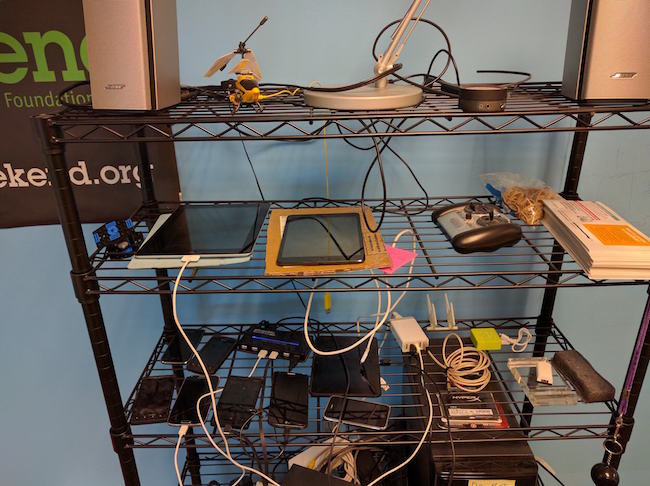
Address: 505 S. Rosa Road, Suite 225, Madison, WI 53719, USA
This completely community-supported lab has been built up by various members over time. It’s free to any member in the coworking space who wants to use it.
The ODL is expanding soon, so anyone considering using the space should come and check it out.
Qaonrequest (Montreal)
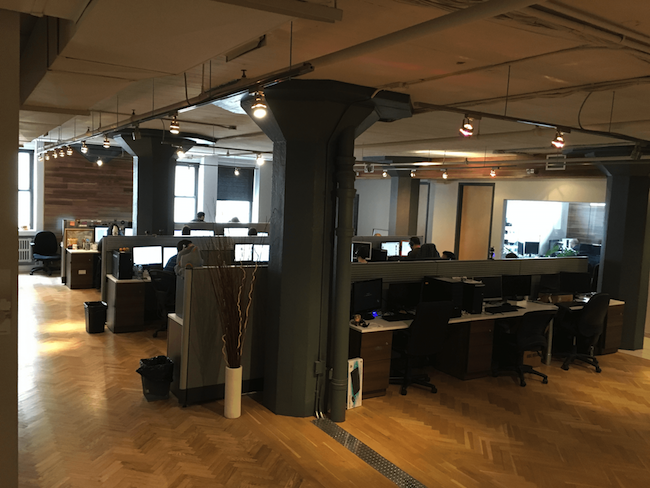
Address: 1470 Peel, Suite 480, Montreal, H3A 1T1
Aside from being the only Open Device Lab in Montreal, this lab is not just a library of devices: It’s run by a friendly team of professional software testers who will happily provide advice and share their knowledge with visitors over coffee.
This ODL is located in the heart of downtown Montreal, so it’s easily accessible by public transportation. It is open on the usual business days between 8:00 am and 18:00. If you can give the team a heads up before visiting, this gives them a chance to prepare a comfortable workspace for the day.
Open Device Lab (Portland)
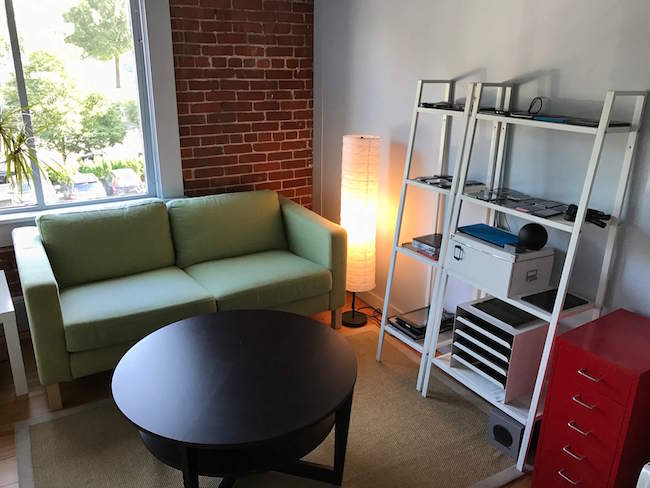
Address: 208 SW 1st Ave, Suite 240, Portland, OR 97204, USA
This friendly community device lab provides a quiet space where people in Portland can come to test their work on a variety of devices.
Of the dozens of mobile devices, cofounder Jason Grigsby says, “We’d love for more Portlanders to come use it. We enjoy sharing our space and learning what people are working on.”
Abstracta In-House Device Lab (Montevideo)
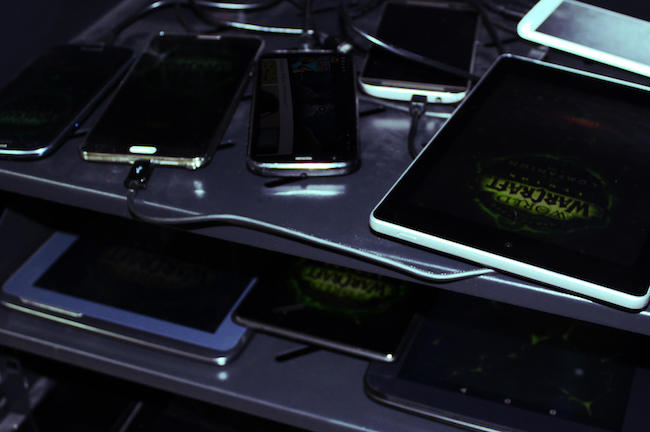
Address: Jose Ellauri 1126, Montevideo, Uruguay
Abstracta is a software company focused on QE, so it knows how to help ODL users. The organization has partnered with Monkop to have many bots automatically run test flows in parallel, while measuring application performance on real devices.
Rest Of The World
BK Device Lab (Bangkok)
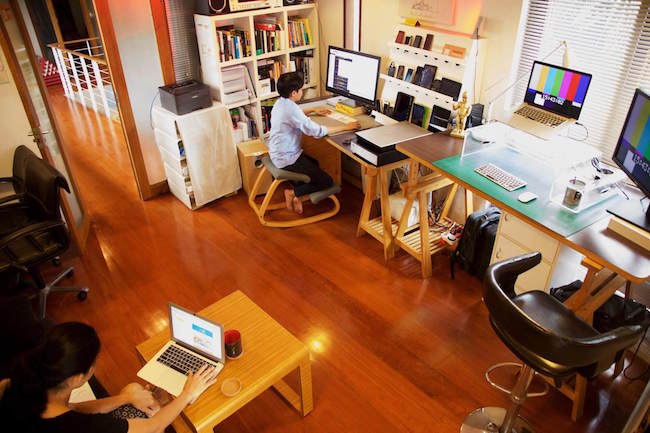
Address: 20 Satri Witthaya 2 Soi 17, Lat Phrao, 10230 Bangkok, Thailand
Thailand’s first ODL was originally started by a team for its own testing needs, before they decided to share their resources with the web and development community in Bangkok.
According to the lab, traffic in Bangkok can be a nightmare, so more ODLs are required in other parts of town to combat this issue. BK Device Lab has built a few extra shelves to store the devices, which can be donated to these other labs based around Bangkok to help them get started.
Nomad Device Lab (Cape Town)
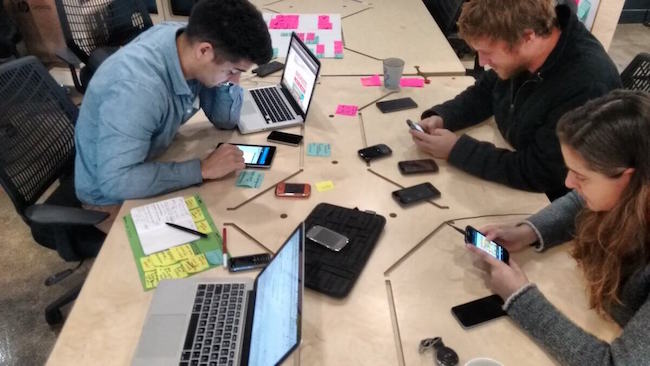
Address: All over Cape Town, South Africa
The devices in this lab are chosen with its local (South African) users in mind and are updated every now and then based on research and statistics, which means the selection leans towards feature phones and lower-end smartphones.
The devices are purposefully kept relatively low in number but cover a wide range of variables (input method, form factor, quality and condition of hardware, device capabilities). The high-level categories that a device belongs to (for example, old Android, cheap smartphone) are more important than the device itself: The lab is aiming for support across a wide range of these variables. Its focus is to help people build “future-friendly things.”
A couple of devices in the lab might seem odd to include (like the Amazon Kindle Touch, the Sony Playstation Vita and the Nintendo 3DS XL) because these aren’t particularly popular devices for web browsing in South Africa, but they are a good way to testing your website on an old device and browser.
Open Device Lab (Perth)
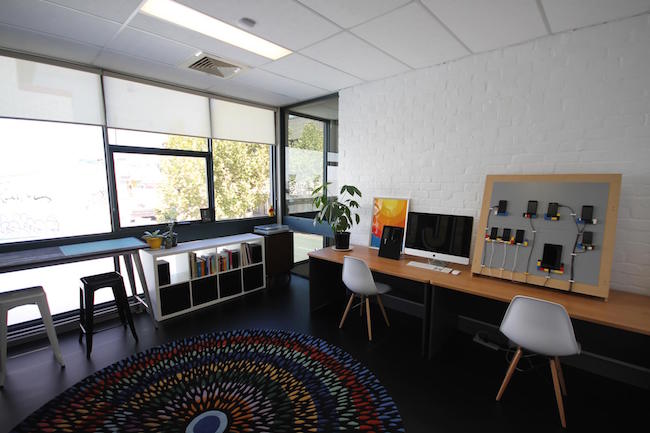
Address: Level 1, 346 William Street Perth, Western Australia
As western Australia’s first (and only) ODL, this space includes a free workspace with a library full of web-related books and a rotating collection of records.
The space is open to all digital professionals, game developers, makers, freelancers and students alike. You can also book for intimate industry and networking events.
UXBERT Open Device Lab (Riyadh)
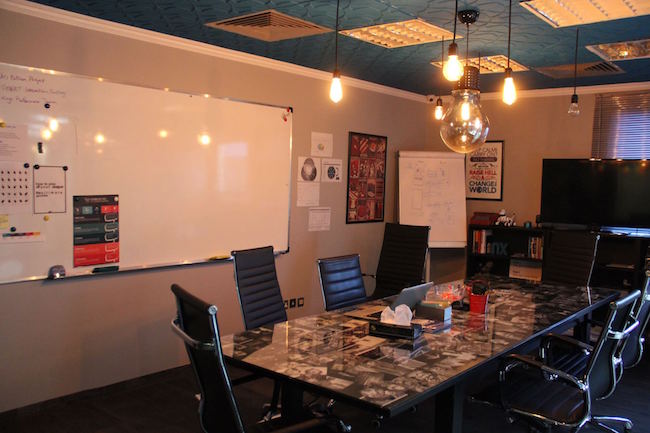
Address: UXBERT Usability Lab, Al Nemer Center 1, Olaya Street, Riyadh 11372, Saudi Arabia
This state-of-the-art ODL is the only one in Saudi Arabia and only one of three in the Middle East. It’s located in the only commercial usability testing lab in Saudi Arabia and is equipped with the latest technology, including an Oculus Rift, eye-tracking tools and brain EEG control devices.
Large corporate, government and other businesses pay for Arabic UX and usability-testing consulting services based on a project’s requirements, but use of the ODL is completely free for unfunded startups and entrepreneurs. All the lab asks is that you book in advance to ensure that the lab and devices are available.
As well as testing for quality or bugs, visitors can also take advantage of its usability testing lab (depending on equipment availability) to test with real users and record those tests, but you need to bring your own users.
Nadeem Bakhsh, a senior UX, usability and ecommerce consultant at the UXBERT Usability Lab, sas, “Saudi’s tech startup community is young, but it’s full of ambitious people with innovative ideas. We started this device and usability lab to help support these startups to turn their ideas into reality. Using the lab, they not only get access to devices for testing, but can bounce ideas and get insights from our team of Arab UX, usability and ecommerce experts to help develop their ideas into wireframes, user journeys and prototypes.”
The Foolproof Open Device Lab (Singapore)
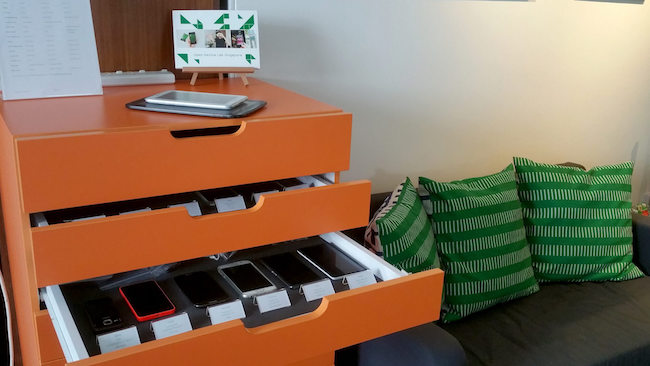
Address: 25 Seah Street, #03-02, Singapore, 188381
This lab has a great mix of new technology and some really ancient devices. The oldest in its collection is a Nokia N85, and it’s got an Oculus Rift and Leap Motion Controller as well. Run by Foolproof, an experience design agency, it does a lot of usability testing alongside other research and also houses a testing and observation lab.
Located at Seah Street in Singapore, a short walk from City Hall MRT station, this ODL is open during usual business hours.
Have more open device labs you want to share? Please let us know in the comments. Thank you!
Further Reading
- Open Device Labs: Why Should We Care?
- Establishing An Open Device Lab
- Noah’s Transition To Mobile Usability Testing
- An Efficient Design-to-Code Handoff Process Using Uno Platform For Figma

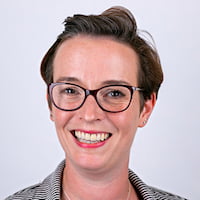

 Check the frontend report!
Check the frontend report! Click here to kickstart your project for free in a matter of minutes.
Click here to kickstart your project for free in a matter of minutes. Start with a free demo —
Start with a free demo — Take a break with a 3D game built on Netlify!
Take a break with a 3D game built on Netlify!



